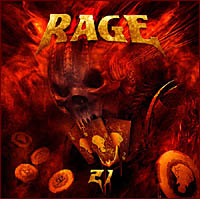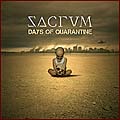RAGE (de) - 21 (2012)

Label : Nuclear Blast Records
Sortie du Scud : 24 février 2012
Pays : Allemagne
Genre : Heavy Metal
Type : Album
Playtime : 11 Titres - 58 Mins
Sophie Davant serait bien aise d’inviter « Peavy » Wagner sur son plateau. Lui, le créateur de RAGE et son charismatique leader, incontournable chanteur et talentueux bassiste pourrait bien nous confier qu’entre son groupe et lui, c’est effectivement toute une histoire. Pas toujours pris au sérieux, notamment en raison de la joie de vivre et de jouer presque communicative qui transpire de leurs derniers efforts, les allemands sont une mécanique bien huilée. Encore aujourd’hui, leur présence sur le devant de la scène fait un bien fou au Heavy Metal allemand, dans une période où ses emblématiques représentants ont des pannes d’érections en série. RAGE, de son côté, continue de danser le daggering au nez et à la barbe de groupes qui aimeraient avoir la même productivité, mais qui actuellement s’occupent de leur problèmes d’arthrite. Une fois n’est pas coutume, ce 21 sera une plaisante démonstration de savoir-faire et d’authenticité. Mais comment font-ils ?
Tout d’abord, ces gaillards sont forts. Forts de 18 albums et de 26 ans de carrière. Deux chiffres qui n’expliqueront pas le titre de l’album, n’en déplaise aux férus de numérologie. Ensuite, ils ont à leur tête un grand monsieur qui respire la bonhommie, en la personne de Peter Wagner, épaulé depuis une grosse décennie par Smolski (guitare). Les deux font la paire et ce n’est certainement pas l’arrivée tardive d’André Hilgers qui est venue briser cette cohésion. RAGE est plus soudé que jamais. Les enseignements à tirer de ce nouvel album sont nombreux. Il faut commencer par se faire à l’idée que ceux qui ont joué les « Straight To Hell » et autres « From The Cradle To The Grave » ne reviendront plus en arrière, même si cet opus peut laisser envisager le contraire. L’oreille distraite remarquera assurément ces tempos à l’ancienne, ces cavalcades endiablées un peu surannées, ce mariage heureux de Heavy et de Thrash qui fleure bon les années 90. En ce sens, RAGE effectue effectivement un rapide retour en arrière. Pas suffisant néanmoins pour conclure que nos teutons regrettent leurs agissements récents. Autre fait marquant, le caractère très grave de leurs nouveaux travaux. Dans ses mélodies, dans ses refrains, dans ses solos, les allemands en avaient surpris plus d’un pour le côté ouvertement « joyeux » de leurs compos. Sans aller jusqu’à dire que ce temps est révolu, RAGE montre un peu plus de sagesse, un peu plus de retenue dans ses chansons, comme un éternel adolescent qui voudrait montrer à ses pairs son aptitude à aborder avec réflexion des sujets sérieux, sans conclure par une sempiternelle boutade. Ce décalage d’avec Strings To A Web existe, mais il n’est pas un obstacle incontournable. Le symphonique bon marché et la machine à tube se sont discrètement effacés au profit de l’intensité d’un riffing rétro et de créations toutes très carrées. Et à ceux qui pourraient regretter l’efficience et la maestria d’un « Empty Hollow », « Psycho Terror » et « Death Romantic » seront les deux gros morceaux de cette galette qui vous feront taper du pied. Au rayon des banalités, pas de remarque particulière sur le chant de Peavy, même si on peut souligner nettement moins de parties chantées qu’auparavant.
Une chose est sûre, être prolixe n’a jamais été un gage d’efficacité. Ce qui l’est, c’est que RAGE, en toute circonstance, propose des idées, des changements, aussi timides soient-ils. Il y a de la vie dans ce groupe et ce 21 n’est pas un spasme post-mortem, comme une poule qui continue de courir quand on lui tranche la gorge. Ces gars ont un don et sont, à l’heure où je vous écris ces lignes, le porte-étendard en activité le plus majestueux et robuste du Heavy teutonique. Increvables vous dis-je.
Ajouté : Mardi 21 Février 2012
Chroniqueur : Stef.
Score :    
Lien en relation: Rage Website
Hits: 10152
|














